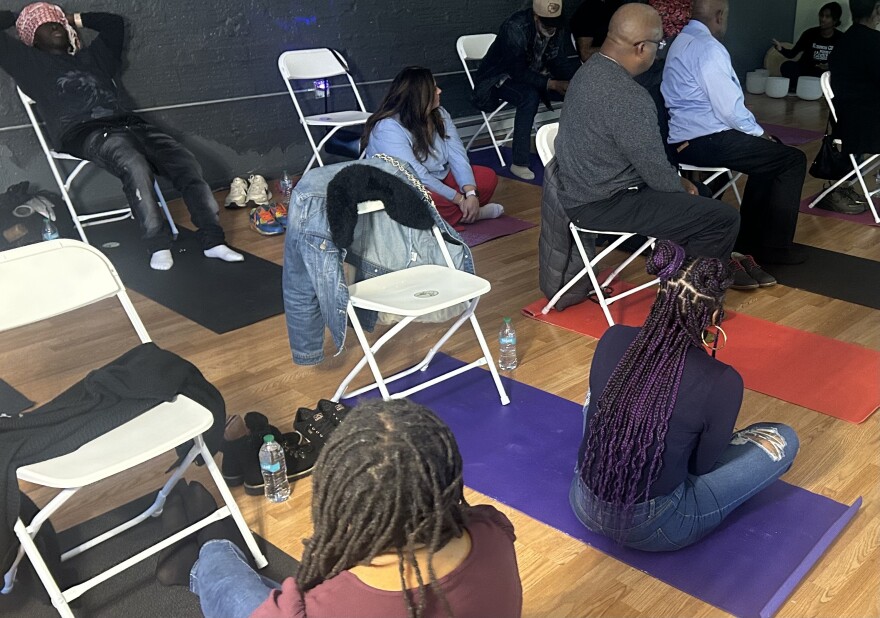Over a dozen individuals sat across from one another in the long narrow yoga studio near 55th and Troost, lifting and lowering their shoulders, flexing and unflexing the muscles in their legs.
Fatimah Walls, 38, was going along with the soft-spoken encouragement coming from the leader to close her eyes and take deep breaths while leaving mental distractions at the door.
“This is my first time doing yoga," Walls said. "I really like it."
Walls said the meditation, the breathing and relaxation exercises, had the greatest impact on her.
“It relieved a lot of stress," she said. "When we sat there and closed our eyes, took deep breaths and inhaled and exhaled, that's something I definitely have to do every day.”

Kansas City’s Wellness Court, launched at the beginning of 2025, is a special section of the Municipal Court of Kansas City that combines separate courts for offenders with drug abuse and mental health challenges.
The yoga program is new — a partnership between AIMwell Yoga studio and the Kansas City Health Department. It's called "Healing Justice" and is in a trial phase.
Through a combination of yoga, meditation, and cognitive behavioral therapy, the program aims to help non-violent offenders reframe the old messages in their heads, reduce stress and create long-term behavior change.
Walls preferred not to share her history, only saying she's grateful for this opportunity to redirect her life. "You live and you learn, and I’m just happy I’m here," she said.
Walls said she plans to stick with the program. Others will be asked about their plans as officials survey the group to get their initial thoughts before a formal launch in January 2026. Each session will offer the services of a psychologist, a meditation leader and yoga class.
Debonie Lewis is the owner and yoga instructor at AIMwell. She pitched the idea of Healing Justice to the Wellness Court in spring of 2025, knowing the holistic practice of yoga can benefit addiction and mental health challenges.
Lewis also has a passion for reducing recidivism rates, for finding the best way to keep those with criminal records from committing crimes again.
“Yoga is a tool," she said. "The more that you know within your practice, the more you're able to apply. With good teachers, this is something that anyone can pick up and actually change their habits.”
Lewis and her team have a mantra that they believe drives this kind of change: “Catch, pause, choose." They encourage participants to repeat the three simple words often to interrupt negative messages that replay in their heads.

"So, through the cognitive behavioral process of noticing your thoughts, catching those thoughts ... and some behavior that you’re doing," she said, "and pausing with that and choosing how you want to show up in that space, you're able to actually change."
Courtney Wachal, 46, Kansas City Municipal Court presiding judge, said a lot of the people she sees in her courtroom have never stepped into a yoga studio. She wanted them to tour the facilities, take a test class and see who was interested in the process.
Wachal said the Wellness Court is experimenting with different ways to help nonviolent offenders overcome issues that drive them to reoffend.
“So, we think that this technique of emotional regulation, and dealing with things when they come up, is perfect for substance abuse,” said Wachal. “A lot of that is triggered by certain things so if you can learn these techniques to cook with your triggers, then you’ll be less likely to have a reoccurrence and recidivate.”
For those interested in pursuing the Healing Justice class, an 8-week program will be offered for free in January of next year. Wellness Court offers additional resources to assist with housing, job-training and education.
If participants complete all aspects of the program, remain in a state of sobriety for six months, while maintaining a job, Wachal said their cases would be dismissed.
“We want people to have something sustainable after the program," she said, "when we’re not telling them what to do. We want them to have a sober hobby while maintaining their sobriety."
Once they’ve completed the program, AIMwell will offer classes at a discounted rate.
As Fatimah Walls prepares to walk out of the studio and onto the bus, she said she felt a glow of serenity and relaxation, describing the experience as "uplifting.” She's committed to returning once the program starts up in January.
"Yes, it will help me with everything," she said. "It will help me with things, you know, outside of the court (system) and dealing with work, you know, and things I take into court."





